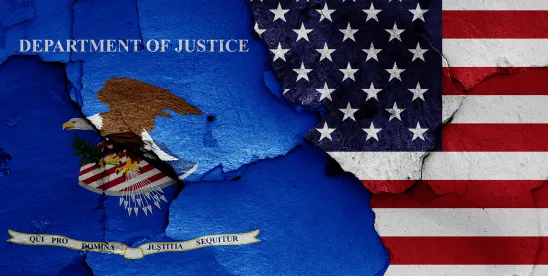On July 30, 2025, the U.S. Department of Justice (“DOJ”) published its “Guidance for Recipients of Federal Funding Regarding Unlawful Discrimination” in the form of a memorandum to federal agencies. The guidance, dated July 29, 2025, applies to all recipients of federal funds, including colleges and universities, K-12 public schools, and federal contractors.
The guidance refers to its content as “non-binding suggestions,” “non-binding best practices,” and “not mandatory requirements but rather practical recommendations to minimize risk of violations.” Nonetheless, colleges, universities, K-12 public schools, and employers should consider the guidance their required reading this summer.
The guidance starts by outlining federal antidiscrimination provisions and law, highlighting Title VI, Title VII, Title IX, and the Equal Protection Clause of the Fourteenth Amendment. The guidance does not include reference to the Americans with Disabilities Act or Section 504 of the Rehabilitation Act, which prohibit discrimination based on disability.
The guidance then details policies and practices that it labels “unlawful” and “that could result in revocation of grant funding.” Notably, the process for revoking grant funding under federal law is not described in the guidance, but it can be found in the guidance from the agencies that enforce these federal laws, such as the U.S. Department of Education’s Office for Civil Rights and the Department of Health and Human Services’ Office for Civil Rights.
Guidance for Institutions of Higher Education
As it relates to institutions of higher education, the DOJ guidance identifies several practices as unlawful due to preferential treatment based on race, sex, or other legally protected characteristics. Notably, race-based scholarships and opportunities exclusive to races or sexes, such as internships, mentorship programs, and leadership initiatives, are deemed discriminatory. Preferential admissions practices that give priority to candidates from underrepresented groups are also highlighted as potentially unlawful. Additionally, the creation of safe spaces and lounges for exclusive use by students of specific racial or ethnic groups, or that discourage access by others, is considered a violation of federal civil rights laws.
Furthermore, the DOJ guidance scrutinizes the use of neutral criteria that result in a disparate impact based on race, sex, or other legally protected characteristics. This includes recruitment efforts focused on specific geographic areas, institutions, and organizations because of race or ethnicity. Requirements for applicants to describe overcoming obstacles or to make diversity statements, which may serve as proxies for race, are also flagged as problematic.
The DOJ guidance also addresses access to single-sex spaces, stating that allowing males into facilities designed for females such as bathrooms, showers, locker rooms, and dormitories, is unlawful. The same applies to allowing males to compete on women’s athletic teams.
In terms of training, the guidance is critical of DEI workshops that segregate participants into race-based groups or are restricted to individuals of a particular race. Trainings that include stereotypical language, such as asserting inherent privilege or toxic masculinity, are also deemed discriminatory by the guidance.
Guidance for Employers
For employers in general, the DOJ guidance lists practices as unlawful when they involve preferential treatment based on race, sex, or other legally protected characteristics. For example, hiring and promotion practices that prioritize candidates from underrepresented groups are flagged as discriminatory. The guidance also indicates that employers must also be cautious of neutral criteria with a disparate impact, such as job requirements emphasizing cultural competence, lived experience, or cross-cultural skills, particularly if these are used to evaluate applicants’ racial or ethnic backgrounds.
Similar to the guidance in Higher Education single-sex spaces, employers should not allow males access to areas designed for females, such as bathrooms, as it is unlawful. In addition, employers should not provide DEI trainings and workshops limited to individuals of a certain race or that separate participants into race-based groups. Trainings using stereotyping language, such as assertions of inherent privilege or toxic masculinity, are flagged as discriminatory.
The DOJ guidance also addresses vendor agreements selected based on race, sex, or legally protected characteristics, such as those favoring “women-owned businesses” or “minority-owned businesses,” which are considered unlawful under the DOJ’s interpretation of civil rights laws.
Potential Impacts of Non-Compliance – Federal Investigations and Funding Loss
One of the most pressing implications of the DOJ’s guidance is the potential risk of federal investigations and/or losing federal funding for non-compliance. Institutions that engage in practices deemed unlawful under the current DOJ’s interpretation of federal civil rights laws may face severe consequences. These severe implications highlight the challenges faced by colleges, universities, and employers in navigating the evolving legal landscape surrounding civil rights and DEI.
Federal funding recipients should note that, in recent matters, the administration, prior to revoking funding, has imposed funding “freezes” while settlement negotiations are underway. Recipients should also be aware that recent federal investigations have been shorter in length than under previous administrations, with findings issued in weeks, rather than months or years. Thus, if a recipient draws federal attention, the repercussions may be relatively swift, which can lead to increased pressure to agree to settle.
Ensuring Ongoing Compliance
Institutions of higher education and employers should ensure ongoing compliance with federal civil rights laws and court precedent, as well as applicable state laws. Colleges, universities, and federal contractors should also pay close attention to this recent DOJ guidance and monitor federal civil rights enforcement actions such as by OCR and DOJ.
Colleges, universities, and employers should consider privileged audits of their programs and policies to ensure compliance and seek legal advice and counsel on best practices.
Based on the DOJ guidance, targeted reviews should focus on:
- Admissions, financial aid, and scholarship-awarding practices. This includes reevaluating recruitment strategies that may have relied on geographical proxies for race and assessing scholarship criteria that could be construed as race-based.
- Hiring and promotion practices and criteria to ensure they do not inadvertently discriminate against any group or include “diversity slates.”
- Training programs to ensure that participants are not excluded and that information presented during trainings is not based on stereotypes.
- Procurement processes, including considering whether to include nondiscrimination clauses in contracts with third parties.
- Non-discrimination, harassment, and retaliation policies and procedures generally to ensure prompt reporting and response.







 />i
/>i
